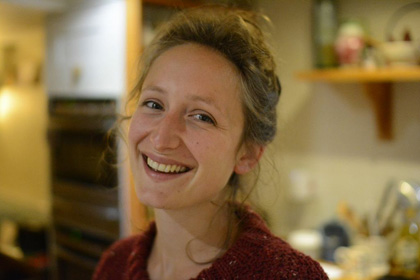The day the music died
by Claire Lowdon When Tamsin Jarvis was twelve, she saw her father kissing another woman.
When Tamsin Jarvis was twelve, she saw her father kissing another woman.
The whole family was up in Manchester to hear him conduct a celebration of British music at the Bridgewater Hall. It was a treat, at the end of the concert, for Tamsin to go to his dressing room all by herself. Her mother had to put ten-year-old Serena to bed in the Jurys Inn Hotel across the road. “Tell Daddy not to hang around chatting, the restaurant’s booked for nine forty-five.”
Backstage, everything was hushed. All the doors had leather quilting. The carpet was very thick. A stagehand with his radio earpiece hooked round his neck pointed her towards the end of the corridor. Tamsin pushed her father’s door open, enjoying its weight and the smooth, silent swing of the hinges.
Three seconds later she closed it again, just as silently. The lovers had been kissing with their eyes shut. Neither of them knew they’d been seen.
The woman was Valery Fischer, the mezzo from the concert. Val and her husband Patrick were old friends of the Jarvises. Their only son, a stocky, sporty eleven-year-old called Alex, played viola in the same youth orchestra as Serena. Last summer, the two families had even spent a long weekend together in a rented cottage in Suffolk.
Tamsin walked slowly back up the corridor, seeing it all over again. Bertrand’s left hand gripping Val’s bottom through the stiff satin of her turquoise strapless dress. His right hand crushing her loosely permed curls. A large raised mole in the middle of Val’s back, pale, like a Rice Krispie. The kiss itself: muscular, forceful, almost angry, as if they were fighting one another with their mouths.
In the foyer, she sat down on the floor next to the ice-cream stand and tried to think. When she closed her eyes, she could hear the sound of her own blood. She could feel it, too, each pulse a tight squirting sensation. Around her, adult chatter thinned to a trickle as the concert-goers left the building. Tamsin stayed where she was, eyes still closed. A Hoover began its melancholy drone.
“Tamsin?”
It was her father. He was still wearing his black trousers, but he’d swapped his tux and dress shirt for a loose grey tunic. He held out one of his big hands for Tamsin to haul herself up with.
“What are you doing down there?”
“We have to go,” said Tamsin. “We’ll be late for supper.”
* * *
For five years she told no one.
Tamsin was frightened: of the pain that disclosure would cause her mother, of the possibility of divorce (a condition that ranked, in her twelve-year-old mind, as second only to cancer). Most of all she was frightened of her father’s anger – which, she realised, would no longer be the familiar, beneficent anger of grown-up to child, father to daughter, but real, unbounded, adult anger.
She hated being alone with him. Car journeys were the worst: prisoner in the passenger seat on the way home from school, her father asking about her day, trying to make her laugh. He was his usual garrulous, ebullient self, fond of hyperbole, susceptible to sentiment, domineering, opinionated, funny, warm. Tamsin could see nothing in his demeanour to suggest that here was a man with a terrible secret. And this was what made him truly monstrous.
Bertrand wasn’t as relaxed as he appeared. He was worried – by Tamsin, about Tamsin. Before, the two of them had been a team. Now she was nervy and skittish, slow in conversation, unwilling to meet his eye. If he hugged her, she hugged back, but she no longer initiated contact between them. On more than one occasion, he had the impression that his touch was actually unpleasant to her.
Before – but before what? Bertrand didn’t know; he couldn’t even really say when the change had occurred. He wondered if some male authority figure had behaved inappropriately towards her – a teacher, or perhaps one of the gap-year students who helped out at her summer music school. When he suggested this to his wife, however, she dismissed it as a typical piece of melodrama. “She’s growing up, that’s all. She can’t be your little girl for ever.” They were in the bedroom, getting ready to go out for the evening. Roz spritzed perfume onto her left wrist, then drew her right wrist across her left in a sawing motion. “She’ll be thirteen soon. It’s just hormones,” she said decisively, meeting her husband’s doubtful frown with a brisk, case-closed sort of look.
As far as her mother was concerned, Tamsin was a textbook teenager: surly and non-responsive at home, perpetually in trouble at school. She collected detentions, missed curfews, got a tattoo.”
Bertrand also wondered whether Tamsin knew about his affair. Somehow, it seemed to him that she might. No matter how firmly he told himself that his anxiety was unfounded, he felt increasingly uneasy in his daughter’s presence; and in time, he found he was unable to prevent unease from translating into mild aversion. He was ashamed of this feeling, and did everything he could to conceal it – to the point where he appeared, if anything, even more affectionate and indulgent towards Tamsin than before.
As far as her mother was concerned, Tamsin was a textbook teenager: surly and non-responsive at home, perpetually in trouble at school. She collected detentions, missed curfews, got a tattoo. At fourteen she spent a night in A&E with a stomach full of vodka and caffeine tablets. At fifteen she pierced her own bellybutton. ‘Hormones’ became Roz’s buzzword, mouthed unsubtly over Tamsin’s head to sympathetic friends. Secretly, she was a little frightened of her eldest daughter. Tamsin at sixteen was a good six inches taller than her mother and almost ethereally thin, with angular shoulders and no hips or breasts to speak of. Cropped halterneck tops exposed the bejewelled bellybutton, elongated by the tautness of her stomach and embellished, more often than not, with a purplish crust of infection.
On the rare occasions that her parents argued, Tamsin lay awake in bed, monitoring the muffled sounds coming up from the kitchen for any change in register that might signal the end. The end: expected and dreaded yet also, in a small, hard way, longed for. But the rapid cadences of blame and recrimination always rallentandoed into a truce, followed, a few minutes later, by her mother’s face at the bedroom door, flushed with guilt and tenderness.
“Darling. All couples argue. There’s nothing to worry about, I promise. Your father and I love each other. And we love you. Love you love you love you.”
Roz perched her small frame on the edge of the bed. Her daughter’s large-lidded eyes – Bertrand’s eyes – were round and wide, a precious glimpse of the little girl who had long since morphed into this difficult, untouchable half-woman.
And so the silence continued, as if it might go on for ever. But later, when Tamsin looked back at that time, she would recall very clearly a sense of anticipation. A firework mutely blossoming, Concorde ripping noiselessly across the sky: those vacuum-packed, suspended seconds before the bang.
From Left of the Bang.
 Claire Lowdon read English at Oxford and is the Assistant Editor of Areté. She has written for Areté, the Times Literary Supplement, New Statesman, Prospect, the Observer and The Sunday Times. Left of the Bang is published by Fourth Estate in hardback and eBook, and available as a Harper Audio download. Read more.
Claire Lowdon read English at Oxford and is the Assistant Editor of Areté. She has written for Areté, the Times Literary Supplement, New Statesman, Prospect, the Observer and The Sunday Times. Left of the Bang is published by Fourth Estate in hardback and eBook, and available as a Harper Audio download. Read more.
CONTEXTS
All-seeing I
Claire Lowdon considers the tricky craft of omniscient narration, and why it has faded from widespread use in fiction since its 19th-century heyday.


